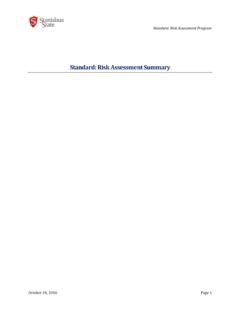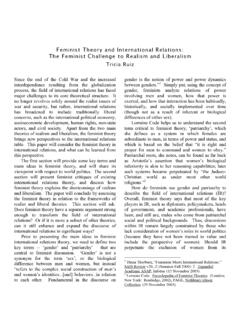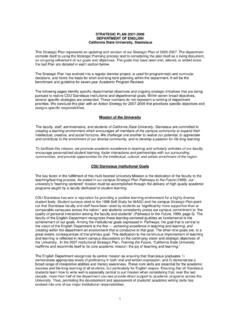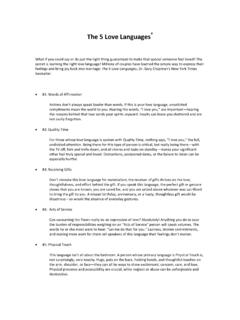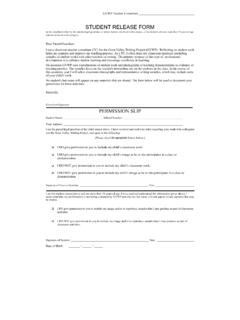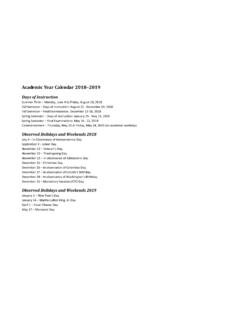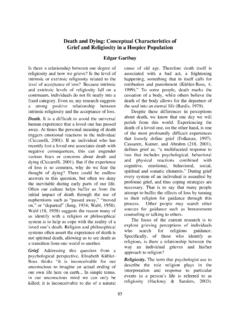Transcription of MARX, ENGELS, AND THE ABOLITION OF THE FAMILY
1 History of European Ideas, Vol. 18, No. 5, pp. 657-672, 19940191-6599 (93) E0194-6 _ . Copyright c 1994 Elseyier Science LtdPrinted in Great Britain. All rights reserved0191-6599/94 $ + , ENGELS, AND THE ABOLITION OF THE FAMILY -RICHARD WEIKART*'It is a peculiar fact' stated Engels a few months after Marx died, 'that with everygreat revolutionary movement the question of 'free love' comes to theforeground'.' By the mid- to late-nineteenth century it was clear to advocates andopponents alike that many socialists shared a propensity to reject the institutionof the FAMILY in favour of 'free love', if not in practice, at least as an ideal. ThePrussian and German Reich governments tried to muzzle the socialist threat tothe FAMILY by drafting legislation in 1849,1874,1876 and 1894, outlawing, amongother things, assaults on the However, the Anti-Socialist Law thatBismarck managed to pass in 1878 contained no mention of the Utopian Socialists Charles Fourier and Robert Owen had preceded Marxand Engels in their rejection of traditional FAMILY relationships, and manynineteenth-century leftists followed their cue.
2 The most famous political leaderof the German socialists, August Bebel though he was a staunch Marxist wrote his immensely popular book, Die Frau und der Sozialismus, under theinfluence of Fourier's ideas. However, not all socialists in the nineteenth centurywere anti- FAMILY . Pierre-Joseph Proudhon, who wielded great influence inFrench socialist and anarchist circles, wanted to retain the FAMILY institution,which he loved and revered. The anarchist Mikhail Bakunin, while jettisoningmost of the traditional FAMILY ties dear to Proudhon, nevertheless thought that avoluntary 'natural FAMILY ' unit consisting of a man, a woman, and their children,would emerge to replace the extant legal Marx and Engels were not the instigators of the anti- FAMILY trendamong socialists, they especially Engels contributed mightily to it.
3 APrussian agent reported back to Marx's brother-in-law, the Prussian Minister ofthe Interior, that the German communists in London, with which Marx wasassociated, were 'so unusually dangerous for the state, the FAMILY and the socialorder'.3 Engels thrust the issue into the foreground shortly after Marx's death bypublishing The Origin of the FAMILY , Private Property, and the State (1884), a workthat, according to Engels, Marx had wanted to write and that reflected Marx'sviews. In 1895 Clara Zetkin, a leader of the socialist women's movement inGermany, praised this work as 'of the most fundamental importance for thestruggle for liberation of the entire female sex'.4 Not only did Engels' book exertinfluence in the late-nineteenth century, but it has enjoyed a renaissance amongcontemporary socialists and feminists, though it has probably received as muchcriticism as praise, even among socialist there were no doubts in the minds of Marx's and Engels'contemporaries that socialism was a threat not only to the state, but also to thefamily, some recent commentators on Marx's and Engel's view of the FAMILY cast* Department of History, California State University, Stanislaus, Turlock, CA 95382, Richard Weikartdoubt on their radicalism.
4 Some construe their attacks on the FAMILY as a call forreform, as an expression of a desire to sweep away abuses, while retaining thebasic FAMILY structure Others discover in Engels' writings on the familynaturalistic elements that allegedly vitiate his radical pronouncements on theabolition of the Finally, some see a contradiction between Marx's ownfamily life and the ideals he interpretations of Marx's and Engels' position on the FAMILY , while oftenraising important points, tend to obscure somewhat the radicalism of their 's and Engels' critique of the FAMILY consisted of three main elements:(1) a depiction of the hypocrisy and inhumanity of the contemporary bourgeoisfamily; (2) the historicisation of the FAMILY , a historical account of the originsand development of the FAMILY in the past; and (3) a vision of the future ' FAMILY ' incommunist society.
5 While Marx once alluded to a higher form of the FAMILY incommunist society, he and Engels usually wrote about the destruction,dissolution, and ABOLITION of the FAMILY . The relationships they envisaged forcommunist society would have little or no resemblance to the FAMILY as it existedin nineteenth-century Europe or indeed anywhere else. Thus it is certainlyappropriate to define their position as the ABOLITION of the FAMILY . Only bymaking the term FAMILY almost infinitely elastic can they be said to haveembraced merely a reformulation of the a political radical and Left Hegelian before his exposure to communistideas in 1843-1844, Marx's view of the FAMILY was much more conventional thanit would be later. In an 1842 article on the newly proposed divorce law forPrussia, he upheld the Hegelian position on marriage, which affirmed it as amoral institution.
6 However, as a staunch opponent of Frederick William IV'sattempt to establish a 'Christian state' in Prussia, he rejected the Prussian law'srecognition of marriage as a religious Marx argued that in its essencemarriage is indissoluble, though in reality it does sometimes die. Thereforedivorce should be granted at times, but instead of being arbitrary, it must simplyreflect the moribund state of the marriage. Thus in 1842 Marx was certainly noproponent of easy divorce and the ABOLITION of the 's first significant exposure to the concept of the ABOLITION of the familyprobably came during his stay in Paris in 1843-1844, when he first imbibedcommunist ideas and held long discussions with numerous socialists and otherradicals who congregated in the French capital. Charles Fourier's ideas played asignificant role in the socialist movement in France in the 1830s and 1840s and hisideas on the FAMILY were propagated in the first volume of the Oeuvres Completespublished in 1841.
7 Fourier advocated the replacement of monogamous marriagewith a system allowing much greater latitude for sexual passions, since hebelieved that monogamy was an institution contrary to human nature and wasthus an impediment to human happiness. He also proposed that children beraised communally, so society would be one, big, harmonious FAMILY rather thanfractured into competitive, squabbling FAMILY Marx had little use for many of Fourier's ideas (indeed Fourier'sown disciples were somewhat selective in their adoption of their visionaryleader's proposals), they forced him to grapple with the issue of the FAMILY andprovided him with ammunition with which to criticise present institutions. In TheGerman Ideology (1845-1846) Marx and Engels showed their acquaintance withMarx, Engels and the FAMILY 659 Fourier's critique of marriage by defending Fourier against an allegedmisinterpretation of Karl Griin.
8 However, Marx and Engels were probably justas mistaken as Griin in their interpretation of Fourier's ideas remainedwith Marx even after he wrote Capital, since he alluded to a Fourierian principleconcerning women's position in society in a letter written in 1868 and toward theend of his life referred to Fourier in his notes on Morgan's Ancient Inanother passage in The German Ideology Marx and Engels asserted that bothFrench and English socialists were pressing for the dissolution of the implies some knowledge, however cursory it may have been, of RobertOwen's disdain for the FAMILY as an institution, since he was the foremost Englishsocialist to attack the is no doubt that Engels' understanding of FAMILY relationships wasstrongly influenced by Fourier and InAnti-Duhring, which was Engels'most influential work, he lavished praise on both socialists for their views on thefamily.
9 He considered Owen's writings on marriage among his most importantworks. Concerning Fourier he wrote, 'Even more masterful is his critique of thebourgeois form of sexual relationships and the position of the woman inbourgeois society'.15 While working onThe Origin oftheFamily in 1884, he wroteto Karl Kautsky that Fourier had brilliantly anticipated Morgan in Indeed Engels originally intended his book to be a comparison ofFourier's, Morgan's, and his own ideas, but time constraints forbade important factor in Marx's intellectual development in the early1840s was his adoption of Feuerbach's transformative criticism of Hegel,whereby he inverted the subject and predicate of Hegel's idealist philosophy, as the subject and existence as the predicate. Feuerbach further arguedthat God was merely the hypostatisation of the ideal human and thus theologycould be reduced to anthropology.
10 He believed that humans created God in theirown image as a consequence of human alienation. Marx took Feuerbach'sanalysis a step actually a giant leap further by applying it to humaninstitutions, including the FAMILY . If the concrete individual and existence precedethe idea of institutions, then these ideals are no longer sacrosanct, but merely thereflection of extant alienation, which Marx considered primarily economic inorigin. In the 'Theses on Feuerbach' Marx made clear what the future of thefamily would be once alienation was overcome: 'Therefore after, for example, theearthly FAMILY is discovered as the secret of the holy FAMILY , the former must itselfbe theoretically and practically destroyed'.18 Even though it was indirect,Feuerbach's contribution to Marx's view of the FAMILY was they adopted a communist position in 1843-1844, Marx and Engels wereunrelenting in their assault on the contemporary condition of the FAMILY .
